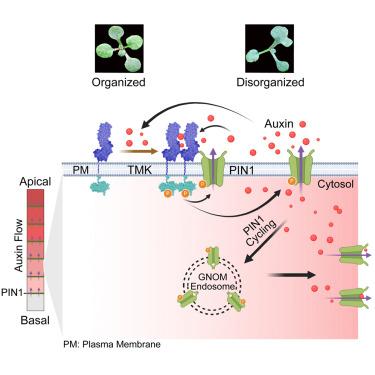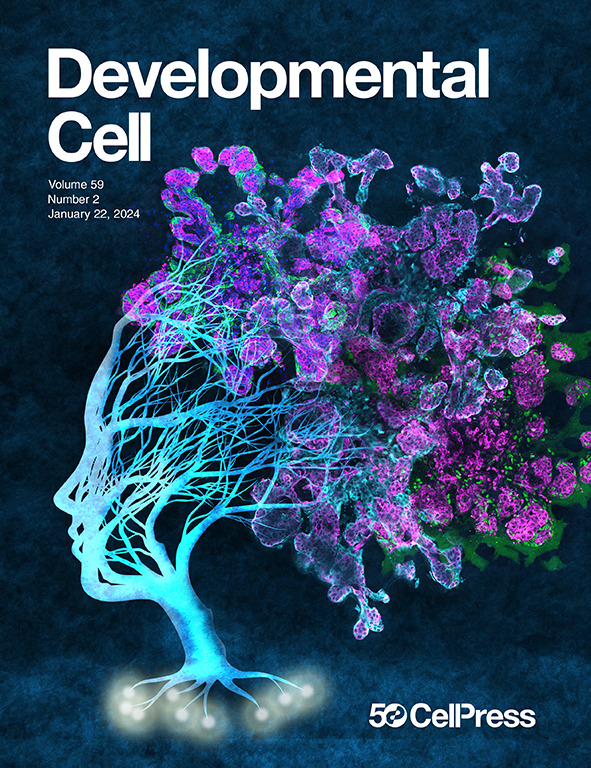TMK-PIN1 drives a short self-organizing circuit for auxin export and signaling in Arabidopsis
IF 8.7
1区 生物学
Q1 CELL BIOLOGY
引用次数: 0
Abstract
The versatile and pivotal roles of the phytohormone auxin in regulating plant growth and development are typically linked to its directional transport, relying on the polarized PIN-FORMED (PIN) auxin exporters at the plasma membrane (PM). For decades, auxin has been proposed to promote PIN polarization, generating self-regulatory feedback mediating much of plant development, but mechanistic insight into this regulation is lacking. Here, we uncover an auxin-induced protein complex at the PM, containing auxin co-receptors transmembrane kinases (TMKs) and PIN1 auxin exporter, as the core machinery that underlies this feedback regulation. Auxin promotes PIN1 phosphorylation by TMKs, modulating PIN1 polarization and transport activity. We also provide evidence that PIN1-exported extracellular auxin is crucial for TMK activation and cell elongation, thus forming the simplest two-element self-regulatory feedback circuit. Thus, these findings offer direct mechanistic insights into a potential self-organizing circuit for auxin signaling and transport to ensure proper plant development in Arabidopsis.

TMK-PIN1驱动拟南芥中生长素输出和信号传导的短自组织电路
植物激素生长素在调节植物生长发育中的关键作用通常与其定向运输有关,这种定向运输依赖于质膜(PM)上的极化PIN- formed (PIN)生长素出口蛋白。几十年来,生长素被认为促进PIN极化,产生自我调节反馈,介导了植物的大部分发育,但缺乏对这种调节的机制认识。在这里,我们在PM发现了生长素诱导的蛋白复合物,包含生长素共受体跨膜激酶(TMKs)和生长素输出PIN1,作为这种反馈调节的核心机制。生长素通过TMKs促进PIN1磷酸化,调节PIN1的极化和运输活性。我们还提供证据表明,pin1输出的细胞外生长素对TMK激活和细胞伸长至关重要,从而形成最简单的二元自我调节反馈回路。因此,这些发现为研究生长素信号和运输的潜在自组织回路提供了直接的机制见解,以确保拟南芥植物的正常发育。
本文章由计算机程序翻译,如有差异,请以英文原文为准。
求助全文
约1分钟内获得全文
求助全文
来源期刊

Developmental cell
生物-发育生物学
CiteScore
18.90
自引率
1.70%
发文量
203
审稿时长
3-6 weeks
期刊介绍:
Developmental Cell, established in 2001, is a comprehensive journal that explores a wide range of topics in cell and developmental biology. Our publication encompasses work across various disciplines within biology, with a particular emphasis on investigating the intersections between cell biology, developmental biology, and other related fields. Our primary objective is to present research conducted through a cell biological perspective, addressing the essential mechanisms governing cell function, cellular interactions, and responses to the environment. Moreover, we focus on understanding the collective behavior of cells, culminating in the formation of tissues, organs, and whole organisms, while also investigating the consequences of any malfunctions in these intricate processes.
 求助内容:
求助内容: 应助结果提醒方式:
应助结果提醒方式:


